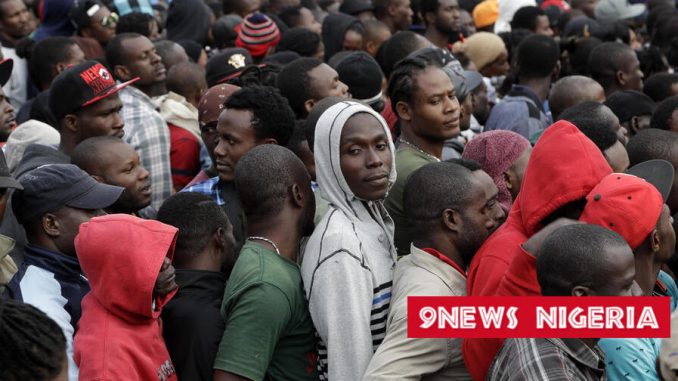
It was On Wednesday that NBC News reported that the US president, Joe Biden’s administration is soliciting bids from contractors who can provide Haitian Creole and Spanish speaking guards for a “migrant detention facility” in Guantánamo Bay. This news, together with the recent images of Haitian refugees being rounded up by U.S. immigration agents on horseback, highlights a basic fact about U.S. history.
People may think that the Trump administration’s policy toward migrants was a historical aberration. But the record demonstrates that deportation has, for the most part, been the United States’ only policy with respect to Haitian asylum seekers. Public discourse, policy discourse and media coverage have repeatedly forgotten about the myriad ways in which the American asylum process has discriminated against Haitians. President Biden’s apparent policy is a continuation of a long-established pattern.
Much of this discrimination stems from a distinction in international law. Refugees, who claim that they are fleeing political oppression, have significant legal rights, even if governments sometimes ignore them. Economic migrants, who are seeking a better life for themselves and their children, do not. In practice, it is hard to be sure who is fleeing political oppression and who is not. This gives governments significant leeway to discriminate against people they don’t want to admit.
These discrepancies have allowed the U.S. government, from the Carter administration on, to come up with legal and practical means to disregard Haitian asylum claims. The “special procedures” that the United States introduced in the 1970s fast-tracked Haitian asylum seekers for deportation. Throughout this period the U.S. government devised policies whereby those seeking entry had their asylum and deportation hearings simultaneously without adequate legal counsel or the benefit of translators.
Furthermore, the government has consistently categorized Haitians as “economic refugees,” claiming they left their home country for better job prospects, not to escape political persecution. This rhetorical sleight-of-hand almost guarantees Haitian asylum claims would be denied. Categorizing Haitian asylum seekers as akin to migrant laborers means they would not meet the criteria for international assistance. As historian Carl Lindskoog notes, the U.S. practice of using detention as a deterrent has effectively kept Haitians from seeking refuge — suggesting, by extension, that the U.S. never seriously attended to the human rights abuse claims of Haitian people.
This isn’t the first time the U.S. government has tried to stop Haitian refugees by sending them to Guantánamo Bay, which is a legal black hole — a territory under U.S. control where people don’t have the same rights to due process as those on U.S. soil. At the beginning of the HIV/AIDS crisis in the 1980s, the Reagan administration claimed that Haitian people were vectors for the disease. This not only prevented Haitian emigrants from donating blood (along with haemophiliacs, heroin users and homosexuals), but was used as a pretext for barring Haitians from entering the country while also dampening tourism to the island. Many Americans came to believe that casual visits to the island would be enough to contract the virus.
These government manoeuvres made it easier to dehumanize Haitians and erect strong boundaries against their inclusion in the American project. The fear of AIDS was used to justify efforts to interdict Haitians at sea. Up to 12,000 of them were shipped to Guantánamo Bay under a policy overseen by William P. Barr (who later became President Donald Trump’s attorney general), while others were returned to Haiti. While then-candidate Bill Clinton sharply criticized this George H.W. Bush policy, it was not interrupted until Randall Robinson went on a hunger strike in 1992.

Although this Clinton about-face provided some hope that U.S. policy toward Haiti would ease, that hope was largely abandoned by 1999 when much of the country was transfixed by the Elian Gonzalez saga unfolding in southern Florida. Politicians and pundits demanded that the 6-year-old Elian, who had been rescued in the Caribbean after his mother died fleeing Cuba, stay in America so that he could seek a “better life.” At just the same time, the Clinton administration returned approximately 400 Haitians who had braved the very same waters back to the island.
Haitian Americans, Haitian immigrants and their supporters protested American policy that allowed Cubans to stay in the U.S. while denying that same opportunity to Haitians fleeing an oppressive regime. The U.S. claimed that Haiti was a democracy. Although many Haitians disagreed, this claim, together with the Haitian government’s support for U.S. anti-communism, justified refusing Haitian asylum claims. On paper, Haitian and Cuban applicants were treated equally, but in practice, Cubans received preference — highlighting a double standard regarding which people the U.S. considers to be “legitimate” asylum seekers.
In 2010, when a catastrophic earthquake struck the island nation, killing 200,000 and triggering a cholera outbreak, the United States granted Haitians temporary protected status (TPS). This temporary designation allows nationals from countries destabilized by conflict or natural disaster to live and work in the United States until they can return home. It was heralded by Haitians and human rights activists as a step toward greater equality in the asylum process and normalization of immigration for Haitians. But despite these hopes, no significant changes were seen under the Obama administration.
In 2020, Trump attempted to end TPS for Haitians, but failed. Although TPS has been extended for Haitians already in the United States until 2023, asylum seekers who have been deported or are being processed for deportation by the Biden administration cannot take advantage of it. Again, a purported health threat — this time, covid-19, the disease caused by the novel coronavirus — is being used to justify repatriating Haitians, despite the country’s ongoing crises, which include covid-19, multiple natural disasters and political turmoil after the July assassination of President Jovenel Moïse.
Source: Washington Post
